Tales From The Crypt | Amicus Anthologies
Richard Petro / 15 October, 2025
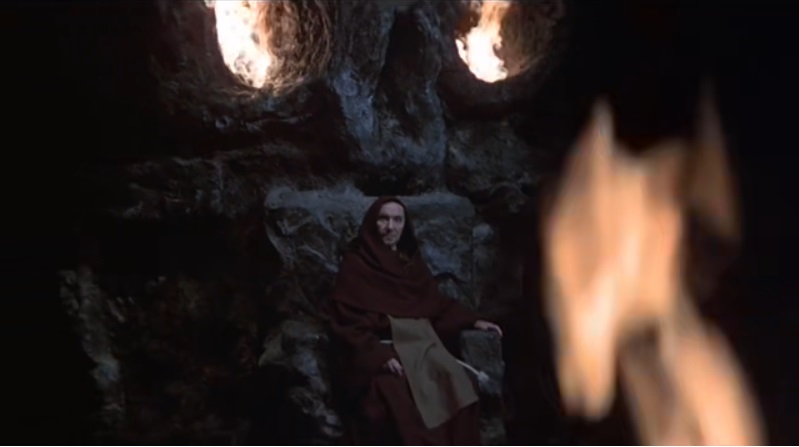
- Directed by: Freddie Francis
- Written by: Milton Subotsky
- Release Date: March 8, 1972
- 92 Minutes
Here we go!
The Framing Story
Whilst exploring some catacombs, five individuals come across the Cryptkeeper, who tells how each will die.
The framing story is not as interesting as the previous three. We had a location tying in to all the stories, Burgess Mereditch playing a carnival man named Dr. Diablo, and Peter Cushing handling tarot; I like Ralph Richardson, but Crypt doesn’t quite have the same oomph feeling to its wrap around as the others. Mind you, I guess it’s not about the wraparound at the end of the day, is it?
And All Through The House
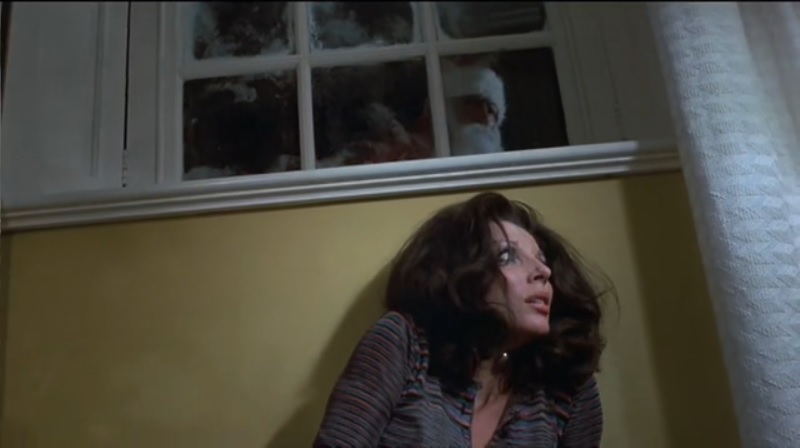
On Christmas Eve Joanna Clayton (Joan Collins) puts her daughter to bed and then murders her husband for his insurance money, all while the radio reveals there happens to be a homicidal maniac on the loose.
Not entirely sure what there is to say here that hasn’t already been said.
Writer/Illustrator Johnny Craig, Vault of Horror comics, Freddie Francis, Joan Collins, Milton Subotsky, Amicus… they all converge here to make what is, arguably, the quintessential horror anthology short. Sure, people may think of the Tales From The Crypt series episode now, but this was just so perfectly crafted from the get-go. Also, not only do we get Joan Collins being awesome in this, but Chloe Franks is here again from The House That Dripped Blood as the daughter. I was happy to see her here. Twas nice.
Anyway, I don’t have to say much of anything for this. If you haven’t seen it before, do so. Just well executed, short horror greatness. Side note, I also love me some red paint ‘blood’. It is my 60s-80s chef’s kiss.
Reflection of Death
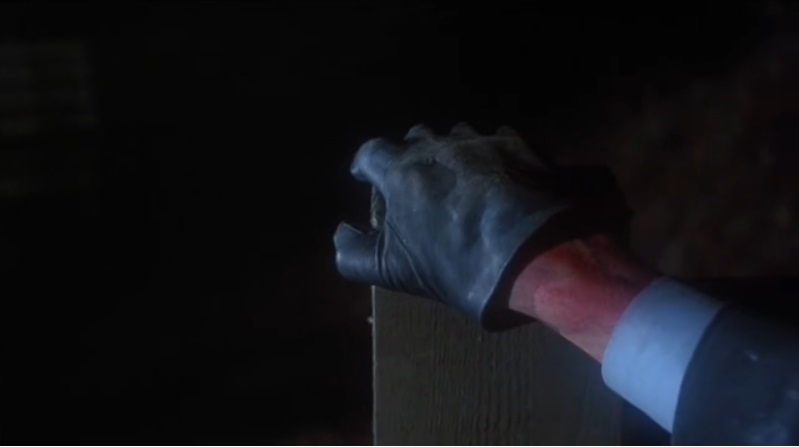
Carl Maitland leaves his family to run off with his secretary, though it doesn’t go quite smoothly.
I can see, and understand, Reflection of Death being regarded as the weakest segment in the film. That’s not a knock against what’s here, as the acting is good and the direction is great in the way it all plays out, but the short falls victim to predictability.
Now, a big part of quite a few of these stories, across the films, is that you are always kind of sure you know where we’re going to end up, and that’s fine. Sometimes the obvious conclusion is such because it’s the most fun and it ends up being satisfactory because of it. Not everything has to be a twist upon twist, it’s okay.
The issue here ends up being that Reflection, unfortunately, is a story that specifically builds to the twist. Other stories have something else going on “over there” and then add a nice little tasty treat on top, but a decent chunk of this story ends up working towards something that you already know is coming and it ends up feeling kind of deflating. I know that some people end up disliking it because half of the segment ends up feeling like it’s dragging its feet and, in some ways worse yet, the added on extra twist ends up with a good ol’ emotion of ‘meh’.
Even with that, I find myself enjoying this well enough, since it’s only about ten minutes long. It’s a breezy story that wraps up quick, though I personally wish that the secondary twist could have been tweaked in some way. Would’ve been nice without something that ends up being used quite often.
Poetic Justice
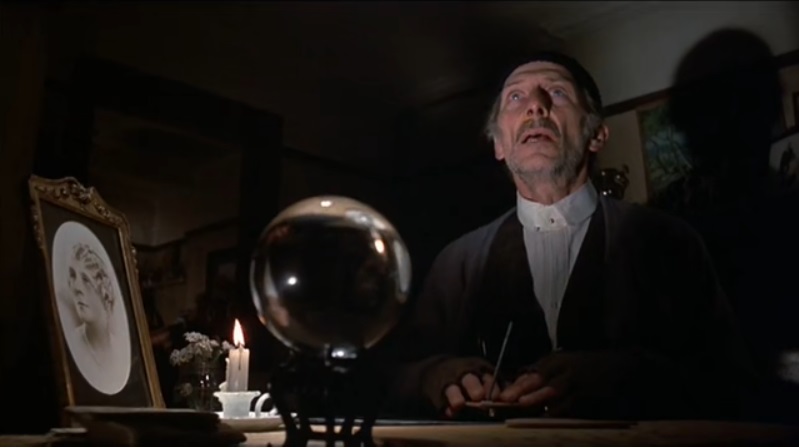
Peter Cushing plays kindhearted widow Arthur Grimsdyke, whose only fault in life is living across the street from the awful Edward Elliot and his son James, who detest Arthur so much that James looks to do something about the man.
Really depressing and frustrating, so yes, it’s fantastic!
As perfect in its execution of an EC Comics story as …And All Through The House, Poetic Justice is one of the best kinds of stories from the publication’s history, as we are forced to get angrier and angrier, more and more frustrated, until the bottom gives out and everything swings back around in a gleeful, wonderful way.
What really makes this a home run is the two main performances at the heart of it. Peter Cushing is his usual self, here made to be one of the most unassuming, kind and sweet-hearted individuals probably ever. Cushing easily brings sympathy, the kind of person you look at and immediately love and your heart breaks for once his eyes slowly fill with more sorrow as the story continues.
Robin Phillips more than meets Cushing here, albeit on the very, very opposite end of the spectrum. His character James, along with someone else still upcoming in this film, is one of the worst kinds of people out there. Venomous and self-serving, every time Phillips is back on screen and speaking is enough to want to strangle him. Just an absolutely great performance that ends up making the finale so much better.
Poetic Justice is great, probably even the best of the “a-hole getting their comeuppance” type of stories, and it helps to be anchored by what I think might be the best of Cushing’s Amicus anthology film performances. Really high on the must-see of their segments.
Wish You Were Here
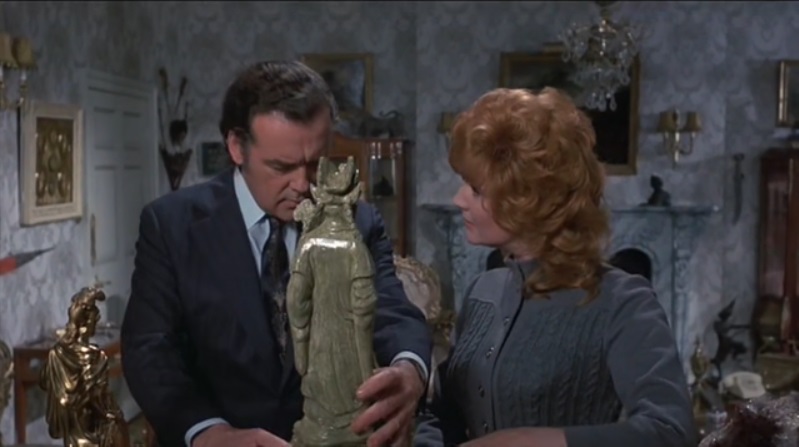
Enid notices that a Chineses figurine in her and her husband Ralph’s collection holds an inscription gifting three wishes to its owner. Enid, unfortunately, decides to use said wish es to help her husband out of some issues.
Just absolutely, ridiculously, darkly hilarious. One may say this story following Poetic Justice causes crazy levels of whiplash, and it does, but the upside is simply that the previous story is so sad for a large chunk of it that following it up this way is really refreshing.
The various ways that every wish is twisted is witty and Roy Dotrice walks away with this segment with his almost head-holding “aye aye aye” performance as his character tries desperately to make Barbara Murray’s Enid stop making this whole thing even worse. Speaking of Barbara Murray, she is also a lot of fun here, as she twirls towards higher heights of campy sobbing.
Wish You Were Here is relatively straightforward, not really twisting and turning away from what you think it’s going for, but it’s a lot of fun to be had, if you’re not too thrown by the sudden shift following the previous segment.
Blind Alleys
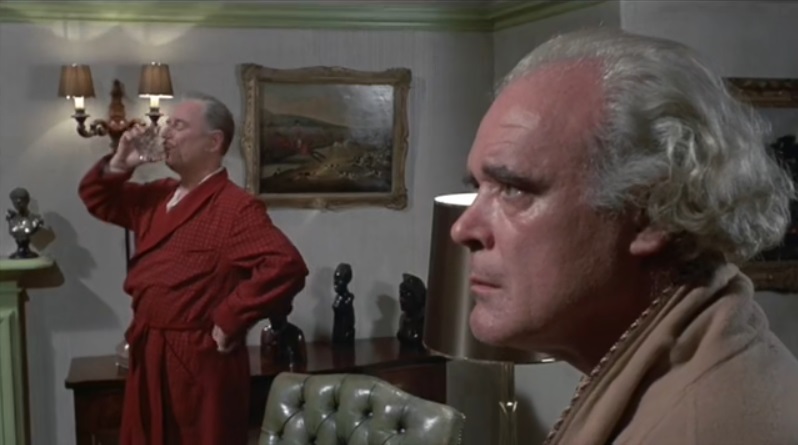
Major Rogers (Nigel Pastrick) arrives at a home for the blind as its new director, along with his dog, and quickly shows his true colours when he cuts into the residents heat and food budget in order to live in fancy himself.
Going hand and hand with Robin Phillips in Poetic Justice, Nigel Patrick’s Major Rogers is just one of the worst types of people. A full blown, self-serving and self-important jackass, to see him get what eventually comes to him is really satisfying. Of course, it wouldn’t work as well with the wrong kind of actor, and Patrick here is great, a perfect embodiment of an awful person that is so far up his own ass that you can tell he can’t be bothered to care about anyone around him in general, let alone when it’s part of his job.
Blind Alleys builds its story quietly and methodically, a bit slower paced and less over the top than the others may be, but the end result is wonderfully realized, and I’ve always appreciated that it’s a story where the comeuppance is more rooted in everyday realism, nothing supernatural and no serial killers here.
Also let’s not forget that Patrick Magee is here, so you know that, if anything, he will always be great!
Tales from the Crypt really holds up and I think it still has a legitimate claim at being one of the best anthology horror films ever. There’s just a great feeling of all-around well roundedness here that others may not have, the stories individually covering different enough corners of horror in an effective way and coming together to make something that just feels like a perfect Halloween package. I watch it every year and every year it never fails to deliver.
